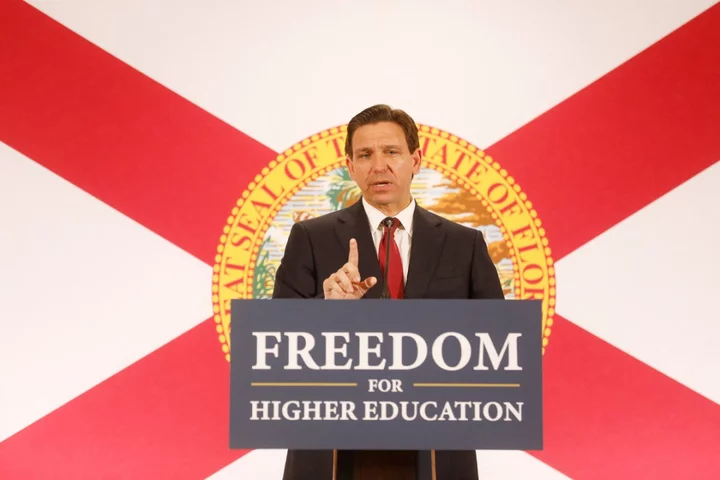
Florida school guidelines can punish trans students and teach how slavery ‘developed skills’ for Black people
A new set of standards for African American history in Florida schools will teach middle schoolers how enslaved people “developed skills” that could be “applied for personal benefit”. Another guideline instructs high schoolers to be taught that a massacre led by white supremacists against Black residents in Ocoee to stop them from voting in 1920 included “acts of violence perpetrated against and by African Americans.” Members of the Florida Board of Education have defended the standards for African American history lessons they unanimously approved, with Ron DeSantis-appointed board member MaryLynn Magar assuring the attendees at a hearing in Orlando on 19 July that “everything is there” and that “the darkest parts of our history are addressed” in the curriculum. But civil rights advocates, educators and Democratic state lawmakers have warned that elements of the guidelines present a distorted, revisionist picture of the state’s history of racism. “The notion that enslaved people benefitted from being enslaved is inaccurate and a scary standard for us to establish in our education system,” Democratic state Rep Anna Eskamani told the board. State Senator Geraldine Thompson said that a recommendation suggesting that Black people sparked the Ocoee massacre is “blaming the victim”. Ms Thompson helped pass a law in 2020 that requires schools to teach lessons about the massacre. The Florida Education Association, the state’s largest teachers union, said in a statement that the standards represent “a big step backward for a state that has required teaching African American history” for more than three decades. “Our children deserve nothing less than truth, justice, and the equity our ancestors shed blood, sweat, and tears for,” NAACP president Derrick Johnson added in a statement. “It is imperative that we understand that the horrors of slavery and Jim Crow were a violation of human rights and represent the darkest period in American history. We refuse to go back.” The new standards add another victory in the DeSantis administration’s radical education overhaul and a “parents’ rights” agenda that has restricted honest lessons of race and racism in state schools, reshaped local school boards, and banned public colleges from offering classes that “distort significant events” or “teach identity politics”. Florida’s Board of Education also adopted five rules targeting LGBT+ students, including punishing transgender students and staff who use restrooms that align with their gender and add barriers to students who want their names and pronouns respected in and out of the classroom. LGBT+ advocates have accused the board and the governor’s administration of weaponizing state agencies to implement the DeSantis agenda as he mounts a national campaign, fuelled in part by what opponents have called “Don’t Say Gay” legislation adopted by several other states. That bill, which Mr DeSantis signed into law in 2022 and expanded earlier this year, has sparked fears that its broad scope could be used to effectively block discussion of LGBT+ people, history and events from state schools, and threaten schools with potential lawsuits over perceived violations. “This politically motivated war on parents, students, and educators needs to stop,” said Jennifer Solomon with Equality Florida. “Our students deserve classrooms where all families are treated with the respect they deserve and all young people are welcomed,” she said in a statement. “Let parents be parents. Let educators be educators. And stop turning our kids’ classrooms into political battlefields to score cheap points.” The African American history curriculum advanced by the board does not fully adopt the recommendations from the African American History Task Force, which urged the board to consider “contemporary issues impacting Africans and African Americans”. Education Commissioner Manny Diaz defended the standards as an “in-depth, deep dive into African American history, which is clearly American history as Governor DeSantis has said, and what Florida has done is expand it.” Under the new standards, students will be taught to simply “identify” famous Black people, but it fails to add requirements for students to learn about their contributions, challenges and stories overall. “We must do better in offering a curriculum that is both age-appropriate and truthful,” according to Democratic state Rep Dianne Hart, chair of Florida’s Legislative Black Caucus. “Education is a critical part of an individual’s personal foundation and when you chose to build a foundation on falsehoods, lies, or by simply erasing history, you’ve laid a foundation that will ultimately fail,” she said in a statement. The board’s adoption of the standards follow the board’s decision to ban the teaching of Advanced Placement African American Studies in high schools, claiming that the course “significantly lacks educational value” and “inexplicably” contradicted Florida law. A letter dated 12 January from the Florida Department of Education to the College Board, which administers AP exams, said the board is welcome to return to the agency with “lawful, historically accurate content”. Read More DeSantis campaign video crossed a line for gay right-wing pundits despite governor’s record on LGBT+ rights Florida schools remove books by John Milton and Toni Morrison and restrict Shakespeare under DeSantis rules Jury awards Florida girl burned by McDonald's Chicken McNugget $800,000 in damages Florida rulings ease concerns about drag performers at Pride parades, drag queen story hours What are the 10 largest US lottery jackpots ever won?
2023-07-21 04:56

Trump defends Jason Aldean amid music video backlash
Former President Donald Trump spoke out in favor of country singer Jason Aldean amid controversy around one of his new music videos. “Jason Aldean is a fantastic guy who just came out with a great new song. Support Jason all the way. MAGA!!!” the former president wrote on Truth Social on Thursday. Online critics blasted the “Try That In A Small Town” music video after discovering it was filmed outside the Maury County Courthouse in Columbia, Tennessee, where 18-year-old Black teenager Henry Choate was lynched in 1927, as well as where the Columbia race riot was held in 1946. As of Wednesday, Country Music Television said it refused to air the music video, USA Today reported. His music video was released Friday. Critics have accused the song of “promoting violence” and lynchings. Mr Aldean responded to the criticism in a lengthy tweet on Tuesday. He said for him, the song “refers to the feeling of a community that I had growing up, where we took care of our neighbors, regardless of differences of background or belief. Because they were our neighbors, and that was above any differences.” He added, “while I can try and respect others to have their own interpretation of a song with music – this one goes too far.” The country singer is a mass shooting survivor. Shannon Watts, founder of Moms Demand Action, reacted to the song’s lyrics: Mr Aldean “who was on-stage during the mass shooting at a Las Vegas concert in 2017 that killed 60 people and wounded over 400 more - has recorded a song called “Try That In A Small Town” about how he and his friends will shoot you if you try to take their guns.” Fellow 2024 presidential candidate and Florida Gov Ron DeSantis also chimed in with support for the country singer in an interview on “Fox & Friends”: “We need to restore sanity to this country. I mean, what is going on that that would be something that would be censored? I mean, give me a break. We’re off the rocker here.” South Dakota Republican Gov Kristi Noem posted a video on Wednesday with her reaction to the music video’s backlash: “I’m shocked by what I’m seeing with people attempting to cancel the song, cancel Jason.” She added, “Thank you for writing a song that America can get behind.” Read More ‘A modern lynching song’?: Jason Aldean and the most controversial song in country Jason Aldean responds as row continues over ‘Try That in a Small Town’ The Jason Aldean video is just the tip of the country music iceberg
2023-07-21 04:17

Jefferies Says Banks Are Failing to Price in Water Risk
As extreme heat dominates news headlines, the gate-keepers of global capital are failing to keep pace with a
2023-07-20 23:18
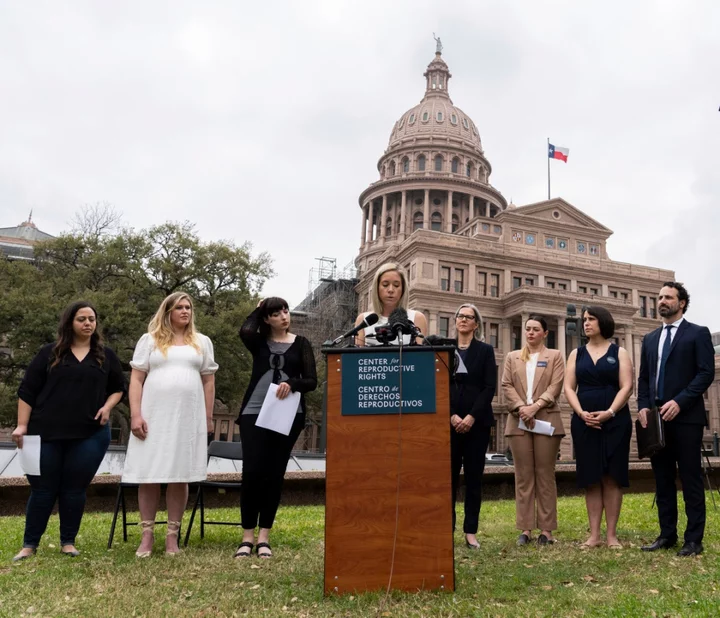
Texas women suing over anti-abortion law give historic and heartbreaking testimony in a landmark court case
In March, unable to legally obtain abortion care in Texas, Samantha Casiano was forced to carry a nonviable pregnancy to term, and gave birth to a three-pound baby who died hours later. Ms Casiano is among 13 women denied emergency abortion care under state law who are suing the state in a landmark case that is now in front of a Texas judge. In harrowing, historic courtroom testimony in Austin on 19 July, Ms Casiano and two other plaintiffs described their agony, isolation and heartbreak as they detailed their traumatic, life-threatening pregnancies and the state’s failure to care for them. As she described her experience to the court through tears, Ms Casiano vomited from the witness stand. “I watched my baby suffer for four hours,” she said in her testimony. “I am so sorry I couldn’t release you to heaven sooner. There was no mercy for her.” Abortion rights legal advocacy group Center for Reproductive Rights Texas filed the lawsuit on behalf of the women in March to force Texas authorities to clarify emergency medical exceptions to the state’s overlapping anti-abortion laws, marking the first-ever case brought by pregnant patients against such laws. Their testimony has underscored the depth of impacts from Texas laws and similar anti-abortion laws across the country, with abortion access stripped away for millions of Americans who are now exposed to dangerous legal and medical minefields during their pregnancies. The conflicting exemptions for medical emergencies in Texas have resulted in widespread confusion among providers and hospitals fearing legal blowback or severe criminal penalties, according to abortion rights advocates. Healthcare providers in the state found in violation of those laws could lose their medical license, face tens of thousands of dollars in fines, or receive a sentence of life in prison. The plaintiffs “suffered unimaginable tragedy” directly because of the state’s anti-abortion laws, Center for Reproductive Rights attorney Molly Duane said in her opening arguments. Texas officials and the state’s medical board have “done nothing” to clarify the law, she said. “I feel like my hands are tied,” said Houston obstetrician-gynecologist Dr Damla Karsa. “I have the skill, training and experience to provide care but I’m unable to do so. It’s gut-wrenching. I am looking for clarity, for a promise that I’m not going to be prosecuted for providing care.” Attorneys for the state have sought to dismiss the case altogether, arguing in court filings that the women lack standing to challenge the law because it is ultimately uncertain they will face similar complications again, that their “alleged prospective injuries are purely hypothetical”, and that some of the plaintiffs admitted they have since “struggled to become pregnant” again after their traumatic experiences. Amanda Zurawski, the lead plaintiff in the case, is still hoping to become pregnant after her life-threatening pregnancy. She called the state’s argument “infuriating and disgusting and ironic.” “Do they not realise the reason why I might not be able to get pregnant again is because of what happened to me as a result of the laws that they support?” she told the court. “Anybody who’s been through infertility will tell you it is the most isolating, grueling, lonely, difficult thing a person can go through.” ‘I wished I was dreaming. I knew I wasn’t’ Ms Casiano, a mother of four, was hoping for a girl. When she visited her physician for a checkup last September, “all of a sudden the room went cold” and quiet, she testified. Her daughter was diagnosed with anencephaly, a fatal birth defect in which a baby is born without parts of a brain or skull. “My first thought was … ‘maybe it’s a surgery, maybe she can be fixed,’ and then she said, ‘I’m sorry, but your daughter is incompatible with life, and she will pass away before or after birth,’” Ms Casiano said. “I felt cold,” she said. “I was hurt. I wished I was dreaming. I knew I wasn’t. I just felt lost.” A case worker at her obstetrician’s office gave her a pamphlet with funeral homes. She was prescribed antidepressants. She could not be referred for abortion care anywhere in the state. Texas was the first to implement a near-total ban on abortion, months before the US Supreme Court struck down the constitutional right to abortion last June, a decision that triggered a wave of state laws and legislation from anti-abortion lawmakers and governors to restrict care and threaten providers with criminal penalties. Amanda Zurawski endured several rounds of fertility treatments, tests, surgeries and misdiagnoses before learning she was pregnant in May of last year. “We were at first in shock … we were over-the-moon excited,” Ms Zurawski said. But her obstetrician discovered that she dilated prematurely, and soon after her membranes ruptured, draining amniotic fluid and endangering the life of her expected child. Doctors informed her there was nothing they could do under what was recently enacted state law, despite knowing with “complete certainty we were going to lose our daughter,” she said. The condition led to life-threatening sepsis. Doctors ultimately induced labor. Her daughter, which she named Willow, was not alive when she delivered. Ms Zurawski and her husband are still trying for pregnancy, but the trauma has closed one of her fallopian tubes, and a doctor had to surgically reconstruct her uterus. They also are considering in vitro fertilization, surrogacy and adoption. She previously testified to members of Congress about her experience, a story she will continue to tell, even if it is “excruciating” to do so, she told the Texas courtroom. “I know that what happened to me is happening to people all over the country. … So many people are being hurt by similarly restrictive bans,” she said. She has spoken out “because I can, and I know a lot of people who are experiencing or will experience something similar who can’t speak out, and it’s for those people I will,” she said. Healthcare providers caring for pregnant patients in the months after the Supreme Court’s decision to overturn Roe v Wade have faced severe obstacles for providing standard medical care in states where abortion is effectively outlawed, leading to delays and worsening and dangerous health outcomes for patients, according to a first-of-its-kind report released earlier this year. Individual reports from patients and providers like those named in the Texas lawsuit have shed some light on the wide range of harm facing pregnant women in states where access to abortion care is restricted or outright banned. But reporting from the University of California San Francisco captures examples from across the country, painting a “stark picture of how the fall of Roe is impacting healthcare in states that restrict abortion,” according to the report’s author Dr Daniel Grossman. More than a dozen states, mostly in the South, have effectively outlawed or severely restricted access to abortion care after the Supreme Court’s decision in Dobbs v Jackson Women’s Health Organization last June. The decision has also opened new legal challenges, ones that could once again reshape the future of abortion access in America, while anti-abortion lawmakers and Republican candidates face a public that is overwhelmingly against such bans. ‘I don’t feel safe to have children in Texas anymore’ Ashley Brandt sent a picture of an ultrasound to her husband when she found out she was pregnant with twins. But after her 12-week ultrasound last May, doctors discovered one of the twins had acrania, in which the skull of the fetus is not formed, and brain tissue is exposed to amniotic fluid. The condition is fatal. Despite no chance of the twin’s survival, Ms Brandt was not eligible under Texas law for a procedure called a selective fetal reduction; Twin A still had some signs of life, like muscle spasms and cardiac activity. They traveled to neighbouring Colorado for care, and she returned home the day after the procedure. She gave birth to her daughter in November. “If I had not gone out of state and just done what was legal in Texas, my daughter … would likely have been in the [neonatal intensive care unit],” she said. “All of my ultrasounds leading up to labor I would have had to watch twin A … deteriorate more and more, every ultrasound. … I would have to give birth to an identical version of my daughter without a skull, without a brain, and I would have to hold her until she died, and I would have to sign a death certificate, and hold a funeral.” She said the state has failed to account for medical emergencies like hers. “I don’t feel safe to have children in Texas anymore,” she said. “It was very clear that my health didn’t really matter, that my daughter’s health didn’t really matter.” Read More ‘I felt I couldn’t tell anyone’: The stigma of abortion keeps women silent. It’s time for us to shout Ohio voters are likely to decide the future of abortion rights One year after Roe v Wade fell, anti-abortion laws threaten millions. The battle for access is far from over
2023-07-20 08:59
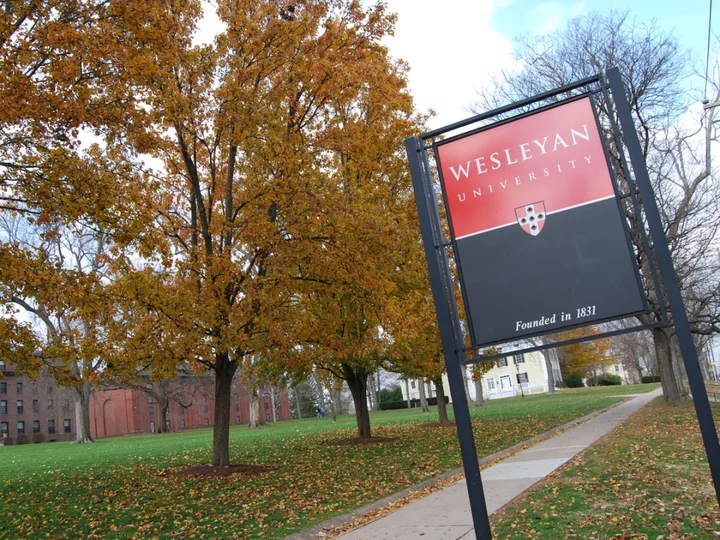
Elite liberal arts university ends legacy admissions in wake of Supreme Court ruling on affirmative action
An elite liberal arts university has taken steps in re-evaluating its admission process by ending legacy preferences following the Supreme Court’s decision to strike down affirmative action. Wesleyan University, a private college in Connecticut, announced in a letter on Wednesday that terminating its use of legacy admissions would benefit diversity on campus and cited the Court’s ruling as a catalyst in the decision. “In the wake of the recent Supreme Court decision regarding affirmative action, we believe it important to formally end admissions preference for ‘legacy applicants,’” Wesleyan University President Michael S Roth wrote. “We still value the ongoing relationships that come from multi-generational Wesleyan attendance, but there will be no ‘bump’ in the selection process.” The school is the first prominent higher education institution to end legacy admissions following the Court’s decision to end affirmative action in June. Going forward, Wesleyan said it will promote a diverse student body by recruiting students from areas across the US outside of big cities and coasts, recruiting veterans and investing in a pipeline to recruit community college graduates. They also plan to increase financial aid support by normalising a three-year option, creating a scholarship program to recruit and support undergraduates from Africa and developing more free-credit bearing courses online. In his letter, Mr Roth clarified that an applicant’s connection to the university has never guaranteed them a spot and family members of alumni are admitted on their own merits “as has been almost always the case for a long time.” The announcement marks Wesleyan’s formal ending of any legacy-based admissions. Wesleyan joins a small group of other colleges and universities that have ended legacy admissions like Amherst College which concluded legacy preference in 2021, John Hopkins University which made the decision in 2020 and Massachusetts Institute of Technology (MIT) which has never considered legacy. For more than 20 years, colleges and universities have used affirmative action to help establish a diverse pool of accepted students. Race is not used as the sole factor in determining a student’s acceptance but it can be considered if there are two applicants with nearly identical qualifications that meet or exceed the school’s application standard. Mr Roth echoed this in his letter, saying Wesleyan “has never fixated on a checked box indicating a student’s racial identification” and has always taken a “holistic view” by looking at applicants’ records, letters of recommendation, college essays and more. But in a 6-3 decision last month, the Court struck down the long-used tool in two consolidated cases: Students for Fair Admissions v Harvard and Students for Fair Admissions v University of North Carolina. Now, institutions of higher education can no longer consider race as a factor unless a student volunteers information about their race or culture in their personal essay. Advocates of affirmative action called on colleges and universities to re-evaluate their admissions processes and establish other methods of cultivating a diverse campus. President Joe Biden encouraged schools to “not abandon their commitment to ensuring student bodies of diverse backgrounds” and directed the Department of Education to analyse practices that hold diversity back. Those practices include legacy admissions which Mr Biden said, “expands privilege instead of opportunity.” Read More Supreme Court strikes down affirmative action, banning colleges from factoring race in admissions Slim majority of Americans support Supreme Court’s affirmative action ruling, but most believe politics rules the court Harvard sued over ‘legacy admissions’ after Supreme Court targets affirmative action Biden condemns Supreme Court striking down affirmative action: ‘This is not a normal court’
2023-07-20 00:45

First Southern Hemisphere Direct Air Capture Plant Planned
Octavia Carbon and Cella Mineral Storage have agreed to build the first direct air capture plant in the
2023-07-19 21:45

Tupac Shakur - News: Las Vegas police search home in connection with historic murder of hip hop star
Las Vegas police confirmed Tuesday (18 July) that it has issued a search warrant in connection with the unsolved murder of rapper Tupac Shakur. Shakur (also known by his stage name 2Pac) was fatally shot in September 1996 in a drive-by shooting in the Nevada city; he was 25. The Las Vegas Metropolitan Police Department told The Associated Press that a search warrant was executed for a home in the nearby city of Henderson. Police made entry into the home on 17 July; however, no further details on the search have been made available at this time. No arrests have ever been made in the case. Shakur had attended a boxing match with the now-incarcerated record executive Suge Knight in Vegas when a car pulled up alongside theirs on Las Vegas Boulevard and opened fire. The rapper was struck four times in the shooting and died six days later from internal bleeding.
2023-07-19 11:27
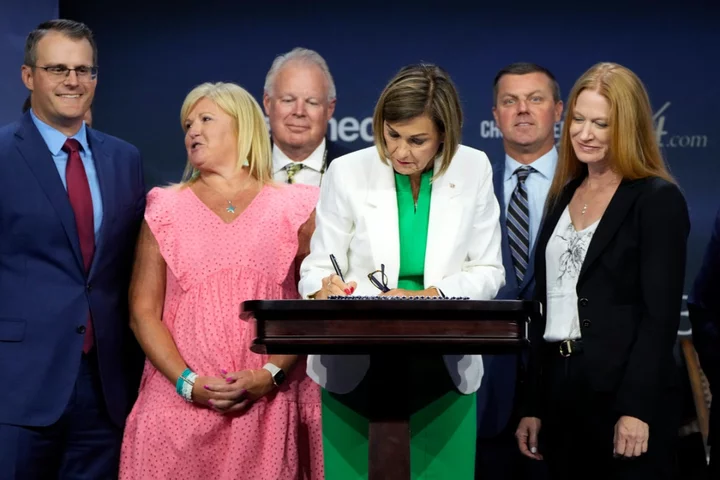
Iowa governor plans to appeal block on restrictive abortion law
Iowa Gov. Kim Reynolds said on Tuesday that plans are in progress to appeal a temporary block on the state's new, restrictive abortion law, previewing a likely emotional court battle that could take months to resolve. Reynolds told reporters at the Iowa Capitol that her staff is working with lawyers in Attorney General Brenna Bird's office to work out the details, so “it's just a matter of time,” she said. The Republican-controlled Legislature approved the measure to ban most abortions after about six weeks of pregnancy during a special session last week, and it went into effect Friday, immediately after Reynolds signed it. The ACLU of Iowa, Planned Parenthood North Central States and the Emma Goldman Clinic launched a legal challenge and on Monday, Judge Joseph Seidlin granted their request to pause the law as the courts assess its constitutionality. Abortion providers said they scrambled to fit in as many appointments as possible before the governor signed the bill, making hundreds of calls to prepare patients for the uncertainty and keeping clinics open late. After the ruling, providers at Planned Parenthood and the Emma Goldman Clinic indicated they were relieved but conscious of the long legal fight ahead. “I think the bill that we passed is constitutional, especially with the changes that we’ve seen," said Reynolds, who alluded to the Iowa Supreme Court and the U.S. Supreme Court reversing previous rulings that affirmed a woman's fundamental right to abortion. “We passed it, it went into law, and for three days we were saving babies,” she said. “I think the right to life is the most important right that we have.” Read More Ukraine war’s heaviest fight rages in east - follow live Charity boss speaks out over ‘traumatic’ encounter with royal aide
2023-07-19 05:24

Canada’s Carbon Pricing Policy: It’s How You Say It That Matters
Carbon taxes are an economist’s dream and a politician’s nightmare, as climate solutions go. Get them right and
2023-07-18 22:54

EU Carbon Import Tax Shifts Climate Burden, South Africa Says
The European Union’s plan to put a carbon levy on imported goods from outside the bloc is an
2023-07-18 21:52

Sasol Slammed by South Africa’s Pollution Regulator Over Lack of Investment
Sasol Ltd. was castigated by South Africa’s national air quality officer for failing to cut pollution as its
2023-07-14 15:22
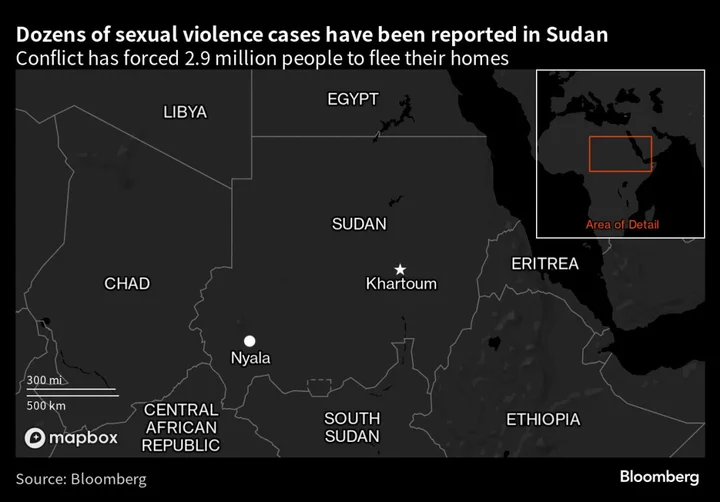
Women and Girls Share Stories of Abuse in Sudan as Conflict Rages
On May 9, shortly after her 12th birthday, Muna left her home in Khartoum and walked to the
2023-07-14 12:22
